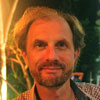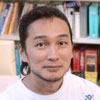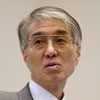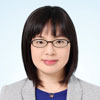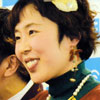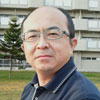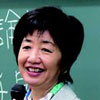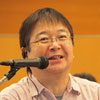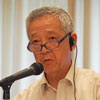Speakers (In alphabetical order)
Japanese
Keith BAVERSTOCK- Research Area:
- Environment Science, Radiobiology
- Affiliation:
- Department of Environmental Science, University of Eastern Finland
Kyle CLEVELAND- Research Area:
- Sociology
- Affiliation:
- Institute of Contemporary Asian Studies (ICAS), Temple University’s Japan Campus (TUJ)
Paul JOBIN- Research Area:
- Sociology
- Affiliation:
- Department of East Asian Studies, University of Paris Diderot & CRCAO
KAGEURA Kyo- Research Area:
- Structure of Information Media
- Affiliation:
- Graduate School of Interdisciplinaryand Information Sciences, University of Tokyo
KOIDE Hiroaki- Research Area:
- Nuclear Engineering
- Affiliation:
- Kyoto University Research Reactor Institute (KURRI)
MATSUDA Yoko- Research Area:
- Community disaster management
- Affiliation:
- Research Institute of Disaster Area Reconstruction, Kwansei Gakuin University
OSHIDORI Mako- Research Area:
- Journalist
- Affiliation:
- Free Press Association of Japan – FPAJ
Sebastian PFLUGBEIL- Research Area:
- Physics
- Affiliation:
- Gesellschaft für Strahlenschutz e.V. (German Society for Radiation Protection)

© Xanthe Hall, IPPNW
Alex ROSEN
- Research Area:
- Pediatrician
- Affiliation:
- International Physicians for the Prevention of Nuclear War (IPPNW), Germany
TANIOKA Kuniko- Research Area:
- Advanced education
- Affiliation:
- Shigakkan University
TSUDA Toshihide- Research Area:
- Epidemiology Environmental Health
- Affiliation:
- Department of Human Ecology, Okayama University Graduate School of Environmental and Life Science
Round-table: Co-chair
Sebastian PFLUGBEIL- Research Area:
- Physics
- Affiliation:
- Gesellschaft für Strahlenschutz e.V. (German Society for Radiation Protection)
SHIMAZONO Susumu- Research Area:
- Religious Studies, Death and Life Studies, Bioethics
- Affiliation:
- Institute of Grief Care, Faculty of Theology Sophia University
Emeritus professor, University of Tokyo
Keith BAVERSTOCK
Profile
Keith Baverstock has worked in the discipline of the health effects of radiation for the past 40 years, initially for the Medical Research Council in the UK and then from 1991 for the European Regional Office of the World Health Organisation. Currently his research interests are in theoretical biology with particular emphasis on how ionising radiation adversely affects living systems. He is presently a Docent at the University of Eastern Finland.
Kyle CLEVELAND
Profile
Kyle Cleveland is Associate Professor of Sociology at Temple University’s Japan Campus (TUJ) (www.tuj.ac.jp) and is the founding director of the university's Institute of Contemporary Asian Studies (ICAS) . His teaching and research interests are in political sociology, race/ethnicity, globalization and Japanese cultural studies. As an International Programs administrator and TUJ's Study Abroad Advisor during the 3.11 Japan disasters, he was involved in the university’s crisis management, serving as a liaison to U.S.-based study abroad providers, and at the height of the nuclear crisis chaperoned an emergency evacuation flight out of Japan with international students. He is writing a book on the political dimensions of radiation assessment in the Fukushima nuclear crisis, examining how foreign governments in Japan responded to the crisis in coordination with the Japanese government, and examining the social and political aftermath of the crisis.
Paul JOBIN
Profile
Paul Jobin is currently Associate Professor at the University of Paris Diderot, Department of East Asian Studies. He holds two BAs, in Chinese and Japanese, a MBA from Keio University (1995) and a PhD in sociology from Ecole des Hautes Etudes en Sciences Sociales (2001). His PhD dissertation, which focused on class actions and industrial pollution in Japan (the Minamata disease and air pollution in Kawasaki-Yokohama) received the Shibusawa-Claudel Prize and was published in 2006. From 2007 to 2013, he was researcher then director of CEFC Taipei—Taiwan Office of the French Centre for Research on Contemporary China. His research has focused on the socio-politics, legal and anthropological implications of industrial pollution and the transformation of labor organizations, focusing on the cases of Japan and Taiwan in particular. Jobin’s research on Japanese and Taiwanese nuclear plant workers began in 2002, as a post-doc grantee from the Japanese Society for the Promotion of Science at the University of Hitotsubashi (Tokyo). He has published several journal articles and presented numerous conference papers on the topic in French, English, Chinese and Japanese. His research highlights the close connection between the health problems and harsh working conditions of the nuclear plant workers and their consequences for the safety of nuclear installations.
KAGEURA Kyo
Profile
Kyo Kageura, PhD, is a professor at the Graduate School of Interdisciplinary Information Studies, the University of Tokyo. He is an editor of the journal "Terminology", author of several books including The Quantitative Analysis of the Dynamnics and Structure of Terminologies (Amsterdam: John Benjamins, 2012), and has published extensively in international journals and conferences in the fields of information studies, terminology, computational linguistics and translation studies. He also runs the online translation aid system Minna no Hon'yaku (Translation of/by/for all; http://trans-aid.jp/).
KOIDE Hiroaki
Profile
Born in Tokyo in 1949. Obtained Nuclear Engineering Degree at the Faculty of Engineering, Tohoku University in 1972. After finishing the graduate school of the same faculty in 1974, he started his carrier as nuclear engineer at Kyoto University Research Reactor Institute (KURRI). He is currently assistant professor, specialized in radiation measurement and nuclear safety. He testified on the insufficiency of nuclear safety at the Ikata nuclear power plant litigation as one of the plaintiffs’ (residents’) witnesses. He authored numerous books, such as "Beyond the reality of radioactive contamination," Hokuto publication, 1992 (republicated by Kawade Shobo, 2011), "Hidden Truth: Nuclear Power = Nuclear Arms," Soshisha, 2010, "Lies About Nuclear Power Plant," Fuyo-sha, 2011.
MATSUDA Yoko
Profile
Yoko Matsuda is a researcher and associate professor in the Institute for the Research of Disaster Area Reconstruction, Kwansei Gakuin University. Her research interests include disaster recovery and preparedness process by local and citizen groups. Previously she was a staff member of Rescue Stock Yard, a Nagoya-based non-profit organization for disaster relief and preparedness. After the Great East Japan Earthquake in 2011, she served as a manager to send 1,500 foot bath volunteers to Tohoku. She received her Dr. Eng. in 2007 from Kyoto University.
OSHIDORI Mako
Profile
Became a performance artist after withdrawal from School of Life Sciences, Faculty of Medicine, Tottori University. Began newsgathering activities after the 2011 Great East Japan Earthquake. Performance artist, Yoshimoto Creative Agency. Director, Free Press Association of Japan (a public interest incorporated foundation). Comic Dialogist, Manzai Kyokai (Comic Backchat Association). Member of editors board, DAYS JAPAN.
Sebastian PFLUGBEIL
Profile
Holds a Ph.D. in physics. Born in 1947. President of the German Society for Radiation Protection. Member of Otto-Hug Radiation Institute in Bonn, and also member of the board of directors for European Committee on Radiation Risk (ECRR). Has participated in many projects analyzing the Chernobyl nuclear power plant accident as well as the Fukushima Daiichi nuclear power plant accident. Participated in activities to support rehabilitation of children residing in areas around the Chernobyl accident site. Founded a citizens' group, "Children of Chernobyl" in Berlin in 1990, and has been on the board of German Association for Chernobyl Help (DVTH - Deutscher Verband für Tschernobylhilfe e.V.) in Munich for several years. Co-founder of the "New Forum (Neues Forum)," the first citizen's group founded in the 1989 democratic movement of East Germany. Served as a Minister for several months in the Hans Modrow government, after the fall of the Berlin Wall, with the goals of reforming energy policy and of closing all nuclear power plants in East Germany. Served as a representative, elected from the New Forum, of the Abgeordnetenhaus of Berlin (the state parliament of Berlin) from 1990 to 1995.
www.strahlenschutz-gesellschaft.de
SHISHIDO Toshinori
Profile
| 1962: | Born in Yanagawa-machi, Date City, Fukushima Prefecture. Completed elementary and junior high school education in Yanagawa-machi, then entered and graduated from Fukushima High School, a prefectural school. |
| 1982: | Entered Rikkyo University, Tokyo, and majored in Japanese Literature in the Department of Letters, College of Arts. |
| 1986: | Graduated from Rikkyo University and became a full-time lecturer at Fukushima High School. |
| 1987: | Hired for a permanent position by Fukushima Prefecture as a high school teacher, and appointed to Futaba High School. Remained employed as a Fukushima prefectural high school teacher. |
| March 2011: | Experienced the Fukushima Daiichi nuclear power plant accident on the job at Fukushima Nishi High School. |
| July 2011: | Retired from the Fukushima Prefecture teaching position, and voluntarily evacuated from Fukushima Prefecture to Hokkaido. |
Kuniko TANIOKA
Profile
| May 1954: | Born in Osaka |
| June 1979: | Bachelor of Science Honor, Biology, Faculty of Arts and Science, University of Toronto, Ontario, Canada |
| March 1985 to November 2005: | Executive director, Chukyo Women’s University Educational Foundation, Aichi, Japan |
| June 1986 to date: | President, Chukyo Women’s University (now called Shigakkan University) as well as Shigakkan University Junior College |
| March 1998: | Ph.D. in Arts and design, the Graduate School of Arts and Design, Kobe Design University |
| November 2005 to date: | Chair of the board, Chukyo Women’s University Educational Foundation (now called Shigakkan Educational Foundation) |
| July 2007 to July 2013: | Member of the House of Councilors.
After the accident of the Fukushima Daiichi nuclear power plant in 2011, she worked as a deputy director general of the accident-dealing project team of the Democratic Party of Japan, supporting the victims, investigating the causes of the accident, and continuing to work on nuclear power. In cooperation with the Diet members from various political parties, she contributed to the establishment of the Nuclear Accident Child Victims’ Support Law. |
TSUDA Toshihide
Profile
Toshihide Tsuda: Professor, Graduate School of Environmental and Life Science, Okayama University (Specialty fields: Epidemiology and Environmental Health)
| 1958: | Born in Himeji City, Hyogo Prefecture |
| 1985: | Received medical license after graduation from Faculty of Medicine, Okayama University Medical School |
| 1989: | M.D., Ph.D., Graduate School of Medicine, Okayama University Medical |
| 1990: | Assistant (Hygiene), Okayama University Medical School
Instructor, Okayama University Medical School
Instructor, Okayama University Graduate School Dentistry and Pharmaceutical Sciences
|
| 2005: | Professor (Environmental Epidemiology), Graduate School Environmental Sciences, Okayama University, which was reorganized to be part of the current Graduate School of Environmental and Life Science |
| |
SHIMAZONO Susumu
Profile
SHIMAZONO Susumu, is a Professor in the Faculty of Theology, Sophia University, and an Emeritus Professor of Religious Studies of the University of Tokyo, has published widely on modern and contemporary religious movements as well as on modern Japanese religions in general. He has published an English book titled From Salvation to Spirituality: Popular Religious Movements in Modern Japan (Trans Pacific Press, 2004).
Back to top


